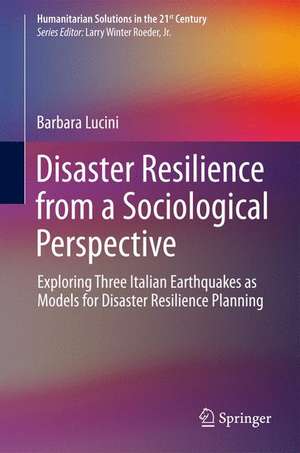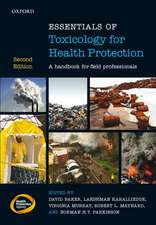Disaster Resilience from a Sociological Perspective: Exploring Three Italian Earthquakes as Models for Disaster Resilience Planning: Humanitarian Solutions in the 21st Century
Autor Barbara Lucinien Limba Engleză Hardback – 15 mai 2014
Disaster Resilience from a Sociological Perspective examines three major earthquakes occurring in Italy over a fourteen - year period for a well-documented analysis of populations' responses to and recovery from disaster, the social variables involved, and the participation of public agencies. This timely volume reviews sociological definitions and models of disaster, identifying core features of vulnerability and multiple levels of individual and social resilience. The analysis contrasts the structural and supportive roles of Italy's civil protection and civil defense services in emergency planning and management as examples of what the author terms professional resilience. And testimony from earthquake survivors and volunteers gives voice to the social processes characteristic of disaster. Among the areas covered:
- Social context for concepts of disaster, vulnerability, risk, and resilience
- Types of resilience: a multidimensional analysis, focused on a physical, ecological, and ecosystem perspective
- Findings from three earthquakes: loss, hope, and community.
- Two systems of organizational response to emergencies
- Toward a relational approach to disaster resilience planning
- Plus helpful tables, methodological notes, and appendices
| Toate formatele și edițiile | Preț | Express |
|---|---|---|
| Paperback (1) | 714.27 lei 6-8 săpt. | |
| Springer International Publishing – 3 sep 2016 | 714.27 lei 6-8 săpt. | |
| Hardback (1) | 721.19 lei 6-8 săpt. | |
| Springer International Publishing – 15 mai 2014 | 721.19 lei 6-8 săpt. |
Preț: 721.19 lei
Preț vechi: 759.15 lei
-5% Nou
Puncte Express: 1082
Preț estimativ în valută:
138.00€ • 144.38$ • 114.64£
138.00€ • 144.38$ • 114.64£
Carte tipărită la comandă
Livrare economică 02-16 aprilie
Preluare comenzi: 021 569.72.76
Specificații
ISBN-13: 9783319047379
ISBN-10: 331904737X
Pagini: 251
Ilustrații: XIV, 251 p. 3 illus., 2 illus. in color.
Dimensiuni: 155 x 235 x 22 mm
Greutate: 0.55 kg
Ediția:2014
Editura: Springer International Publishing
Colecția Springer
Seria Humanitarian Solutions in the 21st Century
Locul publicării:Cham, Switzerland
ISBN-10: 331904737X
Pagini: 251
Ilustrații: XIV, 251 p. 3 illus., 2 illus. in color.
Dimensiuni: 155 x 235 x 22 mm
Greutate: 0.55 kg
Ediția:2014
Editura: Springer International Publishing
Colecția Springer
Seria Humanitarian Solutions in the 21st Century
Locul publicării:Cham, Switzerland
Public țintă
ResearchCuprins
Introduction.- Sociological question of crises and disasters in our contemporary society.- What is resilience? The state of the art.- Organizational response to emergencies: Italian civil protection and civil defence service.- Civil Protection Voluntary Service.- Italian civil protection volunteers: “professional” resilience and the importance of training.- Population experience of earthquakes and possible resilient responses to disasters.- Conclusion.
Notă biografică
Barbara Lucini has a PhD in Sociology and Methodology of Social Research, Catholic University of Sacred Heart, Milan.
She is researcher at Itstime – Department of Sociology – Catholic University of Sacred Heart, Milan, Italy.
She is project coordinator of IDRA and IDRA for women (Itstime Disaster Resilience Agency).
She collaborates in training activities with diverse regional and national agencies.
She is involved in various national and international networks.
Her research interests are focused on disaster resilience, sociology of disaster, crisis and disaster management (national, international and European levels), civil protection systems, civil defence systems, volunteers’ management, risk perception and crisis communication.
She is also interested in environmental and urban sociology, visual studies, disaster anthropology, and methodology of social research.
She is researcher at Itstime – Department of Sociology – Catholic University of Sacred Heart, Milan, Italy.
She is project coordinator of IDRA and IDRA for women (Itstime Disaster Resilience Agency).
She collaborates in training activities with diverse regional and national agencies.
She is involved in various national and international networks.
Her research interests are focused on disaster resilience, sociology of disaster, crisis and disaster management (national, international and European levels), civil protection systems, civil defence systems, volunteers’ management, risk perception and crisis communication.
She is also interested in environmental and urban sociology, visual studies, disaster anthropology, and methodology of social research.
Textul de pe ultima copertă
Natural disasters traumatize individuals, disrupt families, and destabilize communities.Surviving these harrowing events calls for courage, tenacity, and resilience. Professional planning requires specific types of knowledge of how people meet and cope with extreme challenges.
Disaster Resilience from a Sociological Perspective examines three major earthquakes occurring in Italy over a fourteen - year period for a well-documented analysis of populations' responses to and recovery from disaster, the social variables involved, and the participation of public agencies. This timely volume reviews sociological definitions and models of disaster, identifying core features of vulnerability and multiple levels of individual and social resilience. The analysis contrasts the structural and supportive roles of Italy's civil protection and civil defense services in emergency planning and management as examples of what the author terms professional resilience. And testimony from earthquake survivors and volunteers gives voice to the social processes characteristic of disaster. Among the areas covered:
Disaster Resilience from a Sociological Perspective examines three major earthquakes occurring in Italy over a fourteen - year period for a well-documented analysis of populations' responses to and recovery from disaster, the social variables involved, and the participation of public agencies. This timely volume reviews sociological definitions and models of disaster, identifying core features of vulnerability and multiple levels of individual and social resilience. The analysis contrasts the structural and supportive roles of Italy's civil protection and civil defense services in emergency planning and management as examples of what the author terms professional resilience. And testimony from earthquake survivors and volunteers gives voice to the social processes characteristic of disaster. Among the areas covered:
- Social context for concepts of disaster, vulnerability, risk, and resilience
- Types of resilience: a multidimensional analysis, focused on a physical, ecological, and ecosystem perspective
- Findings from three earthquakes: loss, hope, and community.
- Two systems of organizational response to emergencies
- Toward a relational approach to disaster resilience planning
- Plus helpful tables, methodological notes, and appendices
Caracteristici
Focuses on a sociological approach to enhancing disaster resilience at the family and community levels Has practical, operative implications for disaster prevention, planning and management Addresses the critical challenge of security, training, and active responses for future catastrophes
















